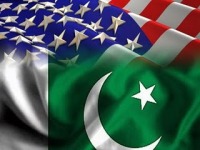Pakistan Feature: US Preparing for a Curtailed "Post-9/11" Relationship With Islamabad? (Schmitt)
 Writing for the New York Times, Eric Schmitt reflects on the future state of US-Pakistan relations after a year in an increasingly fractious "alliance": continued use of drones by the US military, Pakistani anger over the US Government's intervention for CIA agent Raymond Davis, accused of killing two locals, and the reaction to the assassination of Osama bin Laden
Writing for the New York Times, Eric Schmitt reflects on the future state of US-Pakistan relations after a year in an increasingly fractious "alliance": continued use of drones by the US military, Pakistani anger over the US Government's intervention for CIA agent Raymond Davis, accused of killing two locals, and the reaction to the assassination of Osama bin Laden
Schmitt cites a "senior United States official" who speaks of closing "the chapter on the post-9/11 period", trying to frame a decade of US actions guided by a necessary, perhaps even moral, campaign against terrorism. The reality is murkier. Speaking of a "post-9/11 period" conveniently ignores not just the years after 2001 but the complications of decades before that, as it serves a US administration keen to bracket Bush-era foreign intervention as being exceptional, rather than business as usual. It is not as easy for the "post-9/11 period" to wash away the instability in the Pakistani system.
U.S. Prepares for a Curtailed Relationship With Pakistan
Eric Schmitt
With the United States facing the reality that its broad security partnership with Pakistan is over, American officials are seeking to salvage a more limited counterterrorism alliance that they acknowledge will complicate their ability to launch attacks against extremists and move supplies into Afghanistan.
The United States will be forced to restrict drone strikes, limit the number of its spies and soldiers on the ground and spend more to transport supplies through Pakistan to allied troops in Afghanistan, American and Pakistani officials said. United States aid to Pakistan will also be reduced sharply, they said.
“We’ve closed the chapter on the post-9/11 period,” said a senior United States official, who requested anonymity to avoid antagonizing Pakistani officials. “Pakistan has told us very clearly that they are re-evaluating the entire relationship.”
American officials say that the relationship will endure in some form, but that the contours will not be clear until Pakistan completes its wide-ranging review in the coming weeks.
The Obama administration got a taste of the new terms immediately after an American airstrike killed 26 Pakistani soldiers near the Afghan border last month. Pakistan closed the supply routes into Afghanistan, boycotted a conference in Germany on the future of Afghanistan and forced the United States to shut its drone operations at a base in southwestern Pakistan.
Mushahid Hussain Sayed, the secretary general of the Pakistan Muslim League-Q, an opposition political party, summed up the anger that he said many harbored: “We feel like the U.S. treats Pakistan like a rainy-day girlfriend.”
Whatever emerges will be a shadow of the sweeping strategic relationship that Richard C. Holbrooke, President Obama’s special envoy for Afghanistan and Pakistan, championed before his death a year ago. Officials from both countries filled more than a dozen committees to work on issues like health, the rule of law and economic development.
All of that has been abandoned and will most likely be replaced by a much narrower set of agreements on core priorities — countering terrorists, stabilizing Afghanistan and ensuring the safety of Pakistan’s arsenal of more than 100 nuclear weapons — that Pakistan will want spelled out in writing and agreed to in advance.

 Wednesday, December 28, 2011 at 7:44
Wednesday, December 28, 2011 at 7:44
Reader Comments